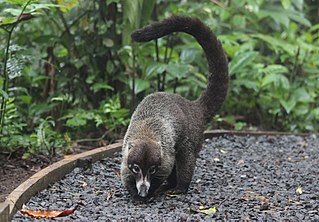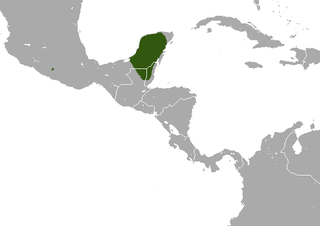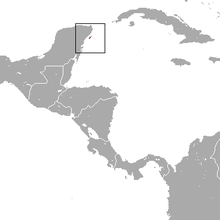
The white-nosed coati, also known as the coatimundi, is a species of coati and a member of the family Procyonidae. Local Spanish names for the species include pizote, antoon, and tejón, depending upon the region. It weighs about 4–6 kg (8.8–13.2 lb). However, males are much larger than females: small females can weigh as little as 2.5 kg (5.5 lb), while large males can weigh as much as 12.2 kg (27 lb). On average, the nose-to-tail length of the species is about 110 cm (3.6 ft) with about half of that being the tail length.

Coatis, also known as coatimundis, are members of the family (Procyonidae) in the genera Nasua and Nasuella. They are diurnal mammals native to South America, Central America, Mexico, and the southwestern United States. The name coatimundi is purportedly derived from the Tupian languages of Brazil.

Procyonidae is a New World family of the order Carnivora. It comprises the raccoons, coatis, kinkajous, olingos, olinguitos, ringtails, and cacomistles. Procyonids inhabit a wide range of environments and are generally omnivorous.

The kinkajou is a tropical rainforest mammal of the family Procyonidae related to olingos, coatis, raccoons, and the ringtail and cacomistle. It is the only member of the genus Potos and is also known as the "honey bear". Kinkajous are arboreal, a lifestyle they evolved independently; they are not closely related to any other tree-dwelling mammal group.

Nasua is a genus of coatis of the family Procyonidae. Two additional species of coatis, commonly known as mountain coatis, are placed in the genus Nasuella.

Mountain coatis are two species of procyonid mammals from the genus Nasuella. Unlike the larger coatis from the genus Nasua, mountain coatis only weigh 1.0–1.5 kilograms (2.2–3.3 lb) and are endemic to the north Andean highlands in South America.

The western mountain coati or western dwarf coati is a small procyonid, found in cloud forest and páramo at altitudes of 1,300–4,250 metres (4,270–13,940 ft) in the Andes of Colombia and Ecuador. A population discovered in the Apurímac–Cuzco region of southern Peru has tentatively been identified as the western mountain coati, but may represent an undescribed taxon.
Dwarf coati can refer to several species:

The South American coati (Can-Coon), also called ring-tailed coati, is a coati species and a member of the raccoon family (Procyonidae), from tropical and subtropical South America. In Brazilian Portuguese, it is known as quati. An adult generally weighs 2–7.2 kg (4.4–15.9 lb) and is 85–113 cm (33–44 in) long, with half of that being its tail. Its color is highly variable and the rings on the tail may be only somewhat visible, but its distinguishing characteristic is that it lacks the largely white snout of its northern relative, the white-nosed coati.

The Cozumel raccoon, also called the pygmy raccoon, is a critically endangered species of island raccoon endemic on Cozumel Island off the coast of the Yucatan Peninsula, Mexico.

The Cozumel harvest mouse is a species of rodent in the family Cricetidae. It is endemic to the Mexican island of Cozumel off the Yucatán Peninsula. It is nocturnal and semiareboreal, and lives in dense secondary forest and forest edge habitats. Its population is small, fluctuating and patchily distributed. The species is threatened by predation from feral cats and dogs and introduced boa constrictors, by competition with introduced nonnative rats and mice, and by habitat disturbances caused by hurricanes and floods which periodically strike the island.

Allen's squirrel is a tree squirrel in the genus Sciurus endemic to northern Mexico. It has no subspecies.

The Sicilian shrew is a species of mammal in the family Soricidae. It is found in Sicily (Italy) and Gozo (Malta). Its natural habitat is temperate shrubland.

The Yucatan small-eared shrew is a species of mammal in the family Soricidae. It is mainly known from lowlands of Guatemala, Belize and Mexico's Yucatán Peninsula, where it has been found in dry scrubland and tropical dry forest at elevations below 100 m. It is threatened by deforestation.
A unique and diverse albeit phylogenetically restricted mammal fauna is known from the Caribbean region. The region—specifically, all islands in the Caribbean Sea and the Bahamas, Turks and Caicos Islands, and Barbados, which are not in the Caribbean Sea but biogeographically belong to the same Caribbean bioregion—has been home to several families found nowhere else, but much of this diversity is now extinct.
The Merriam's small-eared shrew is a species of mammal in the family Soricidae. It is found in Costa Rica, El Salvador, Guatemala, Honduras, Mexico and Nicaragua.
The Oaxacan broad-clawed shrew is a species of mammal in the family Soricidae. It is found in Oaxaca in Mexico.















